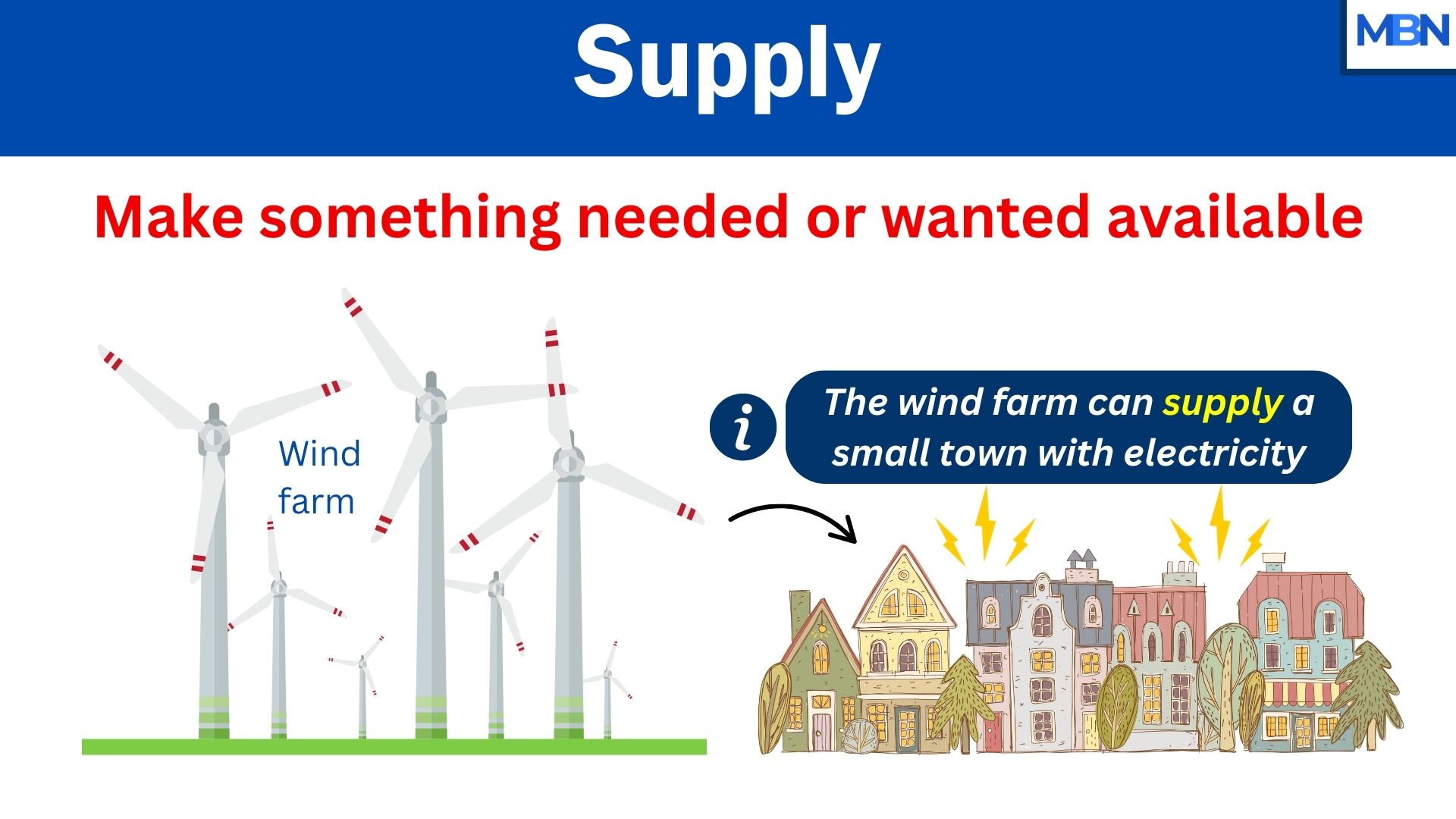The term ‘to supply’ means to provide, or to make something available to a company, person, or other entity. If someone supplies you with fresh fruit, they are your supplier and you are their customer. This act of providing, whether it’s goods or services, constitutes the foundational concept of supply in various sectors and markets.
In business transactions, there are buyers and suppliers. Buyers pay money and receive goods and services, while suppliers supply and sell them. Suppliers are vendors.
Put simply, the supplier is the seller or provider while the customer is the buyer or consumer.

Typically, the verb refers to something that happens over a long time (but not always). Let’s imagine that somebody says: “That wind farm supplies the town with electricity.” They are talking about making electricity available to businesses and residents of the town over the long term.
Supply and Demand
Supply and demand are two very common concepts in economics. They drive the prices of products and services in the marketplace. They also drive salary levels. In this context, the word ‘marketplace‘ means the same as ‘market‘ in its abstract sense.
In the world of economics:
– Demand represents how much of a good or service people want.
– Supply represents the quantity of a good or service that a market can offer. In other words, how much is available or how much can be provided over a specific period.
Effect of Supply/Demand on Prices
When demand for something grows faster than supply, its price usually rises. Conversely, if demand grows more slowly than supply, its price usually declines.
Economists perceive supply and demand as market forces.
Supply Chain
The supply chain is the whole process of making, distributing, and selling commercial products.
It includes every stage, from extracting the raw materials to delivering the finished product to the ultimate consumer.
In other words, it includes everything, from a product’s point of origin to its point of consumption.
Other Meanings
Take over
The verb may also mean to take over or replace, as in “When Harry died, nobody could supply his place.” However, its use with this meaning was more common in the past than today.
Stock or stash
As a noun it can refer to an amount or reserve of something that is available for use, having been supplied.
For example, someone who suffers from hayfever might have a large supply of tissues, meaning they have a substantial amount readily available for use.
Substitute
The noun may also mean ‘substitute’ or ‘temporary.’ For example, a supply teacher is a temporary teacher who substitutes a teacher who is away or ill.
Provisions
The plural form of the noun, i.e., ‘supplies,’ may mean ‘provisions’ or which often includes food, water, and other essential items.
So, if someone is low on supplies, it usually means that they lack basic necessities and likely don’t have much food available.
In this sense, the term may also refer to medication, as in: “The refugee center is low on medical supplies.”
Etymology of Supply
Etymology is the study of the history and origin of words. It is also the study of how the meanings of words have evolved.
Verb
The verb, meaning “to help, support, maintain, fill up, make up for” emerged in the late fourteenth century. It came from the Old French word Soupplier, which meant “fill up, make full.” The Modern French word is Suppléer.
The Old French word came from the Latin word Supplere, which meant “complete, make full, fill up.”
In the 1520s, the verb also acquired the meaning “to furnish, provide.”
Noun
With the meaning “assistance, relief, act of supplying,” the term emerged in the English language in the 15th-century.
In the 16th-century, it also acquired the meaning “that which is provided, quantity or amount of something provided.”
In the 1580s, it also began to mean “person who temporarily takes the place of another.”
It wasn’t until 1776 that it became an economic term, i.e., the corollary of ‘demand.’ In 1650, it also began to mean “necessary provisions held for distribution or use.”
